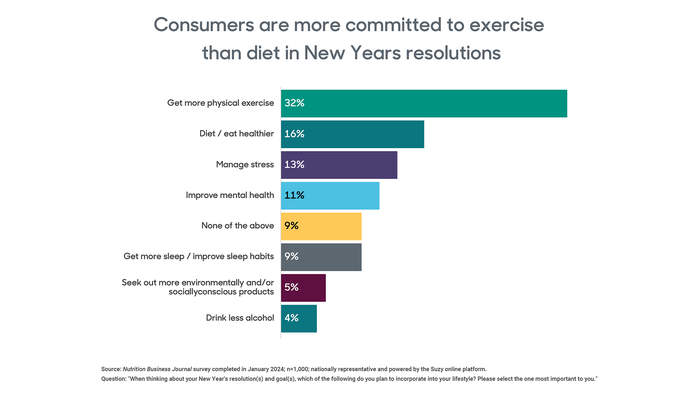Monitor: Consumers more committed to exercise than diet
A New Hope Network poll asking respondents to name their top lifestyle goals in the new year reveals some surprising responses. See the data.

With New Year’s resolutions still fresh in their minds, consumers say they are far more likely to focus on exercise in 2024 than dieting or eating healthy, according to a New Hope Network poll. The results also showed dietary supplements matching better-for-you foods as a go-to strategy.
The results of the poll, which asked respondents to name their top goal, might suggest that people find “diet/eat healthier” far more frustrating and perhaps less life-affirming than exercise. Indeed, the percentage of people opting for that eating-better goal was half the percentage that chose “get more physical exercise.” Eating healthier was not far above “manage stress” in the poll.
Consumers focusing on exercise over healthy eating is far from surprising. Eating healthy in the modern food environment is notoriously difficult, while options for exercise outside the gym have grown since the pandemic. When fitness centers were shut down, millions of people adapted with in-home equipment like Peloton and endurance options as simple as walking.
What that means for the natural products industry becomes clearer when we asked consumers what products they buy to support their resolutions. The fact that supplements matched “whole, organic and/or nutrient-dense foods” tells us that consumers may not have waved the white flag on better eating, but they are clearly looking for help. Nutrition Business Journal data shows sports nutrition among the top-performing categories, growing substantially faster than the overall supplement market. News that Target now sells pre-workout powder reveals how broad the base has grown. Some of that is also captured in the 42% of consumers who say they are buying functional foods to support their goals.

Obviously, sports nutrition and weight management are not the only reasons people take supplements. “Manage stress” was the third most-cited goal in the survey and “get more sleep/improve sleep habits” was the goal of 9% of respondents. Supplement makers offer products for both.
Other interesting findings in the poll include that 23% of respondents said they are purchasing alcohol alternatives such as alcohol-free wine and beer. Although only 4% chose “drink less alcohol” as their most important goal for 2023, the fact that a quarter of consumers are buying the products speaks to how many are not approaching alcohol as an all-or-nothing proposition. Sober-curious appears to be a much larger market than abstainers.
The poll also shows how important the broadly defined “self-care” category is to consumers seeking to start the year healthier. The 46% of consumers who said they buy such products was effectively even with the percentages who chose healthier foods and supplements.
Taken together, the numbers of consumers who make purchases to support their 2024 resolutions shows us what a huge opportunity the yearly tradition can be. People joke about the packed parking lots at the gyms every January, but the chance for brands to meet new consumers in the aisles with new products is very real and one that presents potential for long-term relationships.
About the Author(s)
You May Also Like




